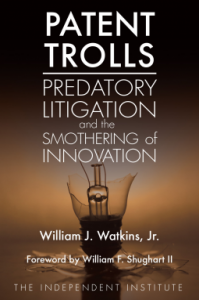The Curious Curator's Book Blog
Contemporary art curator. Student. Book addict. Art lover. Geek. Dreamer. Curious about everything. Check out my website http://thecuriouscurator.com/
Currently reading
Patent Trolls by William J. Watkins, Jr

“Patent Trolls” starts by giving a brief introduction to the history of patents on intellectual property, focusing on the reason they were created: to protect inventors and promote innovation and work that benefits society. In order to encourage innovators, patents were created to give them a temporary monopoly, allowing them to commercialise their creations, recover their investments and reap the benefits, which in turn would allow them to cover for all the time and resources spent on research that did not turn out a commercially viable product.
It is a good idea and a noble cause, but of course, some companies found a way to rig the system and take advantage of innovators. These so-called patent trolls buy sketchy and suspiciously general patents (which, in most cases, should never have been granted in the first place) and sit on them, waiting for productive companies to unknowingly use something that could be interpreted as infringing said rights… And then sue. To make sure nobody can touch them, they favour juries that are mostly uneducated about the subject and thus easily manipulated. The favoured place for plaintiffs in the US is the Eastern District of Texas, where the trolls effortlessly enjoy successes in the form of millions and millions of dollars.
The tone of the writing is rather inflammatory, but I believe it’s warranted. The examples singled out by the book are appalling. They are focused on the software and technology industries because that’s what most patent trolls prefer, a consequence of the large amounts of profits to be made in those industries. The legal meanderings involved in these cases are, as expected, confusing and counter-intuitive. The amounts involved are staggering. Somehow, it feels like the current system has been built completely in favour of patent trolls, under the pretence of encouraging innovation. Of course, patent trolls, who don’t contribute anything to society, want everyone else to keep innovating and producing… So they can swoop in and extort money like financial free-loaders. It’s a complete travesty of what patents were created for, and utterly disrespectful to the creators who actually work towards contributing something to society.
The book includes many sensible recommendations for how this problem can be solved, or at least mitigated. The European Union is presented as an example of how to do things (although we are not completely free from these kinds of litigations). Other solutions include specialised juries and shorter patent terms depending on each industry’s particularities.
The author does his best to convey the facts in an interesting and easy-to-read way, but the book is still on the dry side, and personally, legalese is hard for me to understand in my own language, let alone in a foreign language. So I would encourage you to read this if you are interested in the topic, but only if you are prepared for a relatively hard read.
Note: I got this book for review purposes through NetGalley.









 1
1
